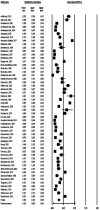The prevalence of workaholism: a systematic review and meta-analysis
- PMID: 38023019
- PMCID: PMC10643257
- DOI: 10.3389/fpsyg.2023.1252373
The prevalence of workaholism: a systematic review and meta-analysis
Abstract
The present study represents the first meta-analysis and systematic review on the prevalence of workaholism. It also investigated if sample size, representativeness, and instrument moderated the prevalence estimates. The analysis was pre-registered at PROSPERO (CRD42023395794). We searched Web of Science, PubMed, CINAHL, Embase, PsychInfo. BASE, MedNar, NYAM, OPENGREY, OpenMD and included the first 200 searches on Google scholar as gray literature [search string: "(workaholi* OR "work addict*") AND (prevalence* OR incident* OR frequen* OR cut-off OR epidem*)]. The search yielded 42 studies to be included, in addition to 11 studies identified using other methods. Two independent raters went through the searches, extracted information and evaluated risk of bias, resulting in agreement ratings of 92.4%, 84.9%, and 87.0%, respectively. The inclusion criteria were studies reporting original data on the prevalence of workaholism written in any European language. Criteria which led to exclusion were conference abstracts, usage of secondary data, purposive sampling of workaholics, qualitative research and pre-determined cut-off based on distribution. Risk of bias of the included articles was evaluated through a checklist. Most of the included studies had a moderate risk of bias. Of the 663 records identified, a total of 53 studies were included, 10 of these being nationally representative with all studies in total amounting to 71,625 participants from 23 countries. The pooled workaholism prevalence was 15.2% (95% CI = 12.4-18.5), which was adjusted to 14.1% (95% CI = 11.2-17.6) following a trim-and-fill adjustment for publication bias. The meta-regression revealed that studies with representative samples reported lower prevalences than those based on non-representative samples, and that studies based on the Dutch Work Addiction Scale yielded higher prevalences than studies employing the Bergen Work Addiction Scale. The regression model explained 29% of the variance implying that a vast amount was still unexplained, and that future research would benefit from the inclusion of other moderators.
Keywords: epidemiology; frequency; meta-analysis; prevalence; systematic review; work addiction; workaholism.
Copyright © 2023 Andersen, Djugum, Sjåstad and Pallesen.
Conflict of interest statement
The authors declare that the research was conducted in the absence of any commercial or financial relationships that could be construed as a potential conflict of interest.
Figures
References
-
- Aldahadha B. (2019). The level of workaholism and its relation to the positive and negative perfectionism. Pol. Psychol. Bull. 50:6031. doi: 10.24425/ppb.2019.126031 - DOI
Publication types
LinkOut - more resources
Full Text Sources



